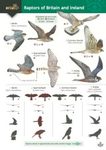About this book
Read our interview with the author here.
Steller's Sea Eagle is the winner of the 2019, TWS (The Wildlife Society) Wildlife Publication Award.
Steller’s Sea Eagle is a remarkable bird. Though familiar in summer to native peoples of the Russian Far East, of the Aleutian Islands and even south-west Alaska, and in winter to those in northern Japan, it was unknown to western ornithologists until the late 18th century. Then, on Vitus Bering’s second journey to discover if Russia and North America were land-linked, it was described by the expedition’s German doctor/naturalist Georg Steller. Standing a metre tall, with a wingspan sometimes approaching 3 m and weighing as much as 9 kg, it is arguably the largest eagle in the world (and certainly one of the biggest three or four.) It also has, without doubt, the most massive bill of any eagle.
The eagle’s late discovery to western science was due to its remote range. Breeding eagles are confined to the Bering Sea coasts of southern Kamchatka and to northern and western coasts of the Sea of Okhotsk. In winter the eagles are largely confined to the southern Kuril Islands and Japan’s northern island of Hokkaido. In winter, climate and geography mean the Sea of Okhotsk defies its position (at about the same latitude as France’s Mediterranean coast) and freezes, Steller’s Sea Eagles wintering on or close to the sea ice, a curiosity that has attracted bird lovers and photographers for many years.
Taking many years to mature, often producing only a single chick each year, and exposed to an incredibly harsh climate during the winter, the species was never abundant. The eagles now also have to contend with the exploration for fossil fuels in the Sea of Okhotsk, particularly on the island of Sakhalin (where the eagles additionally suffer predation by Brown Bears which climb their nesting trees to eat the nestlings). In recent years Russian researchers have worked hard, in conjunction with local oil companies, to reduce the threats from anthropogenic change and bear predation. However, the situation remains challenging, with evidence suggesting that throughout its range the Steller’s population is declining.
This book, the first on the species in English, studies its habitats, diet, breeding behaviour and migration, drawing together information not previously translated from Russian and other sources, to explore the biology of this magnificent eagle. This new book is a translation of an earlier Russian book written by Masterov and Romanov, but with significant changes. The most significant is a new chapter on Steller’s flight and a large number of new photos.
Contents
Introduction
1 General Characteristics: Discovery, Origins, Taxonomy, Plumage 13
2 Energy Balance: Ecological Energetics, Flight, Position in the Ecosystem 50
3 Hunting Methods and Diet 90
4 Distribution, Abundange and Migration 136
5 Habitats 156
6 Breeding Biology 190
7 Biology of the Chicks 206
8 Sakhalin Island and the Lower Amur Region 216
9 Reproduction 236
10 Modelling Population Dynamics 264
11 Genetic Diversity of the Sakhalin Population 282
12 Adverse Factors 290
13 Sea Eagle Protection Measures 312
14 Conclusions 332
Appendix 1 Age Related Changes in Plumage 336
Appendix 2 Diet across the Range 344
References 354
Index 380
Customer Reviews
Biography
Vladimir B. Masterov is an associate scientist at Lomonosov Moscow State University (MSU). He began studying Steller’s Sea Eagles 1986 in the Lower Amur region and has since devoted the greater part of his scientifc activities to the eagles, in the Lower Amur, on Sakhalin Island, on the Shantar Islands, the Kamchatka Peninsula, the southern Kuril Islands and on Hokkaido. In 1996-1997, with the support of the World Wildlife Fund, he organised research on the distribution and biology of Steller’s on the north-western and southern coasts of the Sea of Okhotsk, on eastern Kamchatka, northern Sakhalin Island and in the Tatar Strait. Since 1997 he has continued to work on Steller’s, extending his work to the southern Kuril Islands and to Hokkaido, amassing further information on population levels, and on the ecology, physiology, abundance, and productivity of the eagles across their range. Since 2000 he has been involved in implementing a longterm monitoring program for the Amur Steller’s population under a joint project of the Eurasian Regional Association of Zoos and Aquariums and MSU. Some of the data in this book formed the basis of his PhD thesis Ecological Energetics and Interspecies Relationships of sea eagles (Haliaeetus albicilla L. and Haliaeetus pelagicus Pall.) in the Lower Amur Region and Sakhalin Island (1992).
Michael Romanov is a research associate with the Institute of Mathematical Problems of Biology, a branch of the Keldysh Institute of Applied Mathematics, Russian Academy of Sciences. His main interest is in mathematical ecology modelling. The ecology of birds of prey has been, and remains, the subject of his research, which was reflected in his PhD thesis. In 2004, he joined the Masterov group: since then Steller’s Sea Eagle has been the focus of his research interests.
Richard Sale is a physicist with a PhD in astrophysics, who now devotes his time to studying Arctic ecology and the flight dynamics of raptors. He has studied Steller’s on Kamchatka and Hokkaido, as well as working with a captive eagle in the UK. With Eugene Potapov he co-authored The Gyrfalcon monograph which won the US Wildlife Society Book of the Year in 2006. His other books include The Snowy Owl (again with Eugene Potapov), The Arctic: The Complete Story, and the New Naturalist title Falcons.




























